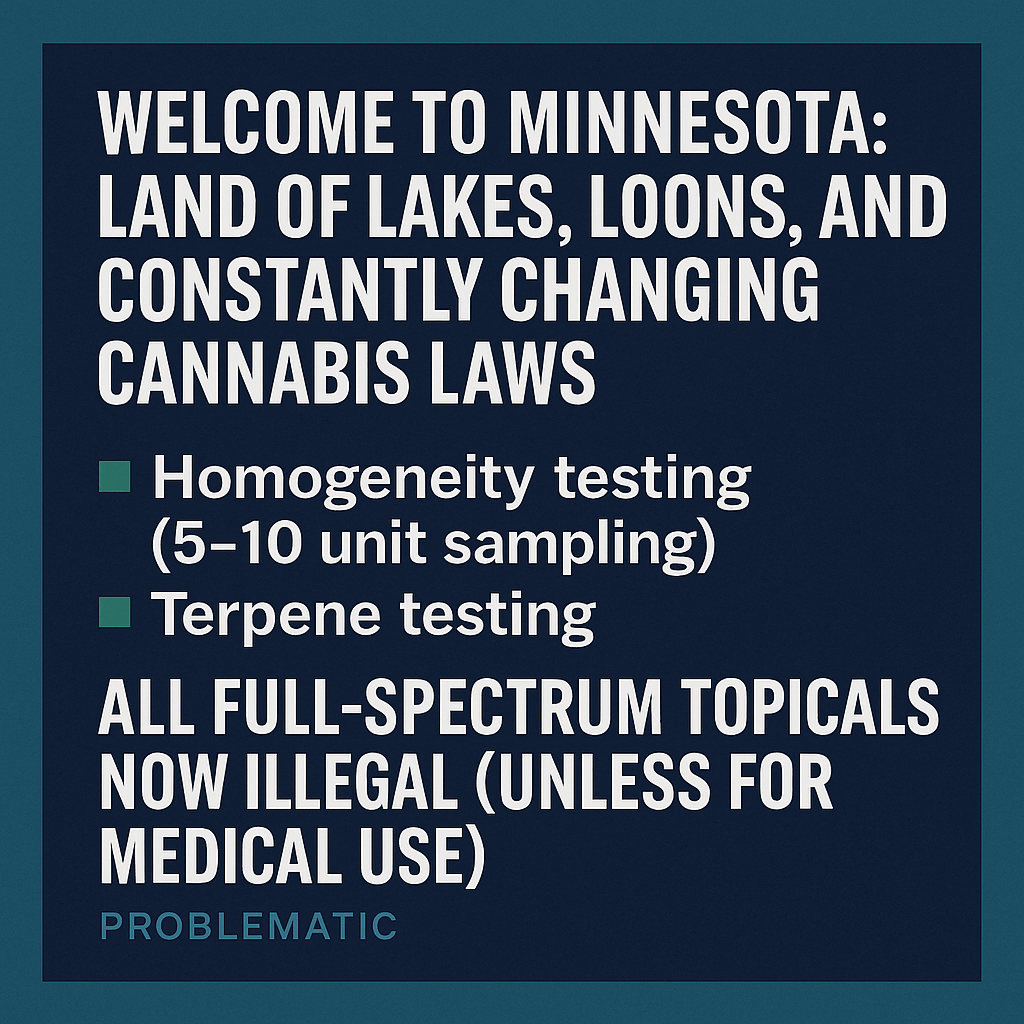Introduction: A Looming Threat to Minnesota's Hemp Industry
Minnesota is home to a robust hemp-derived product economy, with over 6,000 registered businesses involved in cultivation, manufacturing, retail, and distribution. Since hemp was legalized at the federal level under the 2018 Farm Bill, this industry has blossomed, fostering innovation, entrepreneurship, and economic growth across the state. However, a looming regulatory change threatens to upend the progress made by these small and medium-sized enterprises. Beginning January 1, 2026, all hemp-derived product testing must be conducted within the state of Minnesota. Though the intention may be to promote safety, transparency, and support local testing infrastructure, the reality is that the state currently only houses two approved labs capable of conducting these tests.
This mandate, while perhaps well-intentioned, risks creating a bottleneck in the supply chain that could devastate Minnesota's hemp economy. With only two testing labs available, extended lead times are already an issue. The situation is poised to get significantly worse once all 6,000+ businesses are legally required to go through these limited facilities. The testing landscape, capacity constraints, and lack of government trust by prospective lab developers all contribute to a potentially crippling scenario for the state. Additionally, out-of-state hemp product companies looking to enter Minnesota's retail or beverage market will also be required to submit their products for in-state testing. This adds yet another layer of complexity and cost, discouraging interstate commerce and reducing product diversity for Minnesota consumers.
Testing Labs: Current Capacity and Lead Times
Cannabis and hemp testing laboratories require extensive infrastructure, high-end scientific equipment, and a team of trained analysts and chemists to deliver accurate results. A single lab can only process a limited number of samples per week, especially when maintaining high standards of precision and compliance.
Industry averages suggest that a mid-sized cannabis testing lab can process between 200 to 1,000 samples per week, depending on their staffing, equipment, and workflow. With two labs operating in Minnesota, the combined weekly capacity may be, at best, 2,000 samples under ideal conditions. However, given real-world variables like equipment downtime, staffing limitations, and periodic audits, the functional capacity is likely closer to 1,200-1,500 samples per week.
Currently, businesses report lead times ranging from 7 to 14 days just to receive a Certificate of Analysis (COA). In a market that thrives on product freshness, rapid turnaround, and responsive supply chains, this is already a substantial barrier. Once the mandate takes effect in 2026, lead times could balloon to several weeks or even months, as labs struggle to handle exponential increases in sample volume. This threatens to create a chilling effect on the industry, delaying product launches, derailing marketing campaigns, and eroding consumer trust.
Building a New Lab: A Timeline Measured in Years
Establishing a new cannabis or hemp testing lab is neither quick nor easy. A properly outfitted testing facility requires:
-
Commercial laboratory space (zoned appropriately)
-
ISO/IEC 17025 accreditation
-
HPLC, GC-MS, and other specialized instruments
-
Qualified scientific staff
-
QA/QC systems and SOPs
-
Minnesota Department of Health or OCM licensing and inspection
From start to finish, building a compliant lab can take 18-24 months or longer. This includes real estate acquisition, construction or retrofitting, purchasing and calibrating equipment, hiring and training staff, obtaining accreditations, and finally passing state inspections. Any delays in permitting, supply chain issues for lab equipment, or staffing shortages can stretch this timeline further.
Given the current regulatory climate and uncertainty, it is unsurprising that at least two out-of-state or private investors interested in launching labs in Minnesota have halted their projects. The lack of trust in Minnesota's government, especially after shifting regulatory policies and ambiguous enforcement standards, has spooked potential entrants. These parties fear that investing millions into infrastructure could be rendered worthless by another policy shift or bureaucratic hurdle.
The Ripple Effect: Supply Chain Disruption
Mandatory in-state testing doesn't just affect manufacturers and retailers. It disrupts every link in the hemp supply chain:
-
Farmers: Delays in testing raw biomass can lead to spoilage or missed extraction windows.
-
Extractors: Backlogs in testing extracts mean production halts or forced storage, increasing operational costs.
-
Product Manufacturers: Gummies, tinctures, vapes, and topicals can't be packaged or shipped without a valid COA, stalling cash flow.
-
Retailers: Inconsistent inventory availability means fewer sales, unhappy customers, and strained vendor relationships.
-
Consumers: Reduced access to products, potentially higher prices, and decreased trust in product quality or safety.
And importantly, out-of-state beverage and edible companies that wish to sell their products in Minnesota will also be affected. These companies will need to send product samples to Minnesota labs before entering the market. This requirement not only increases time and cost but may deter national brands from participating in Minnesota's retail ecosystem altogether.
The mandate could essentially throttle the velocity of commerce in the hemp sector, freezing the agility that has allowed small businesses to compete, innovate, and survive.
Regulatory Overreach or Misguided Policy?
While the Minnesota government may argue that in-state testing ensures better oversight and consumer protection, this perspective ignores the reality of federal hemp legality. Since hemp is federally legal, businesses should retain the right to select ISO-accredited labs in other states, many of which offer faster turnaround times, specialized testing panels, and economies of scale.
Moreover, most reputable out-of-state labs already adhere to rigorous standards and are subject to regular audits. Restricting testing to in-state facilities limits choice, reduces competition, and gives undue control to a duopoly of labs. In any other industry, such concentrated control would raise anti-competitive concerns.
The Cost of Inaction: A Collapsing Hemp Ecosystem
If Minnesota proceeds with this mandate without significantly expanding its lab capacity, it risks crushing its own thriving hemp industry. Many small businesses operate on tight margins and cannot afford weeks of delay or inflated testing costs. The following consequences are foreseeable:
-
Business Closures: Entrepreneurs may shut down due to unsustainable delays or costs.
-
Job Losses: The ripple effect could cost the state thousands of jobs in farming, manufacturing, and retail.
-
Brain Drain: Innovators and skilled professionals may relocate to states with more favorable conditions.
-
Revenue Decline: Reduced business activity means less tax revenue for the state.
Solutions and Recommendations
-
Delay Implementation: Postpone the mandate until sufficient lab capacity exists.
-
Incentivize New Labs: Offer tax credits, grants, or fast-track permitting to encourage lab development.
-
Maintain Open Market: Allow ISO-accredited labs in other states to continue servicing Minnesota businesses.
-
Public-Private Partnerships: Collaborate with universities or medical labs to bolster testing capacity.
-
Transparent Communication: Provide clear regulatory roadmaps to restore investor confidence.
Conclusion: Minnesota at a Crossroads
Minnesota stands at a critical juncture. It can choose to nurture its hemp-derived industry by fostering a practical, scalable, and business-friendly regulatory environment. Or, it can enact restrictive policies that favor bureaucratic control over market realities, potentially annihilating a promising sector and the livelihoods it supports.
Nothing But Hemp is fully supportive of local testing and science-driven safety protocols. However, the infrastructure must match the ambition. Mandating in-state testing without the lab capacity to support it is not just shortsighted; it's potentially catastrophic.
The state must listen to its entrepreneurs, scientists, and farmers. The future of Minnesota’s hemp economy depends on it.








































